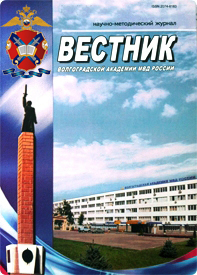The present article touches upon the question of investigation and operation activities rationalization as for crimes investigation and disclosure. While dealing with a problem of investigation and operative search activities rationalization and crimes investigation and disclosure, investigator’s activity is directly connected with searching the most efficient feasibility of using the achievements of criminalistics science in practical activity. In order to have a clear notion of the objective, the investigator should use available data to achieve it and subject to the knowledge of the situation contents and the environment he chooses some means and methods of tactical tasks solution. The concept of investigatory situation holds a specific place in the article. Investigatory situation analysis drives the investigator’s need to exercise control over it as over an activity object while performing an investigation, what is related to the process of resolving the present situation. Methods of taking tactical decisions, as well as such decisions themselves depend of the task complexity that can be divided into simple and troublesome ones. Specific tasks of the case under investigation are being formulated by the investigator himself after information (situation) evaluation and basing on its assessment. Basing on the real background investigative situation assessment the investigator, by means of version method utilization to establish primary tasks and the right way of investigation lead, traces an action plan for investigative and operation-search activities. Moreover the problem of investigation and operative search activities rationalization might be solved not only through searching the most efficient scientific methods of its realization but by means of the investigator’s (inquiry officer) optimization as for work organization.
investigator’s search and cognitive activity, investigative situation, tactic, methodology, situation assessment, operative activity, investigation optimization tactical tasks
1. Kriminalistika: uchebnik / O. V. Volohova [i dr.]; pod red. E. P. Ischenko. M., 2011.
2. Skogoreva T. F. Pravovye i informacionno-kommunikacionnye osnovy organizacii vzaimodeystviya sledovatelya, specialista i eksperta pri rassledovanii prestupleniy: dis. … kand. yurid. nauk. Volgograd, 2008.
3. Yablokov N. P. Kriminalistika: uchebnik / otv. red. N. P. Yablokov. 3-e izd., pererab. i dop. M., 2005.
4. Kondakov N. I. Logicheskiy slovar'-spravochnik. M., 1975.
5. Gerasimov I. F. Nekotorye problemy raskrytiya prestupleniy. Sverdlovsk, 1975.
6. Belkin R. S. Kurs kriminalistiki: v 3 t. M., 1997. T. 3.
7. Cheburenkov A. A. Soderzhanie i znachenie psihologicheskogo komponenta v strukture sledstvennoy situacii // Ros. sledovatel'. 2013. № 6. S. 32-35.
8. Antonov A. N. Reshenie tipovyh zadach rassledovaniya prestupleniy (taktiko-kriminalisticheskiy aspekt): avtoref. dis. … kand. yurid. nauk. Volgograd, 1999. S. 19.
9. Bahteev D. V. Situacionnyy harakter processa rassledovaniya prestupleniy: problemnye situacii i podhody k ih razresheniyu // Ros. yurid. zhurnal. 2013. № 1. S. 106-112.
10. Kornouhov V. E. Uchenie o sledah prestupleniya: genezis, zakonomernosti otrazheniya // Osnovy obschey teorii kriminalistiki. Krasnoyarsk, 1993.
11. Volcheckaya T. S. Situacionnyy podhod v obuchenii kriminalistike // Vestnik kriminalistiki. Vyp. 1. M., 2000. S. 23-28.
12. Popova O. A. Ugolovno-processual'nye i organizacionno-takticheskie oshibki: preduprezhdenie, vyyavlenie i ispravlenie sledovatelem: ucheb. posobie. Volgograd, 2012.









